
Traditional Blues and Why You Should Study It
Dec 02, 2020I've seen many jazz guitarists neglect to learn the blues, but if you ask me, that's a huge mistake.
Here is why you should learn to play the blues:
- Learn about tension and release
- Acquire useful vocabulary (licks)
- Inject a hefty dose of attitude into your playing 😎
"If you can't play the blues... you might as well hang it up!" - Dexter Gordon
Preface
What do I mean by "traditional"? For our purposes, this will refer to old school BB King, T-Bone Walker, John Lee Hooker, and so on.
I hope to not upset the purists with this one as I'm just trying to make a distinction here! 👍
Before we begin, let's just make sure we're all on the same page with the basic blues form:
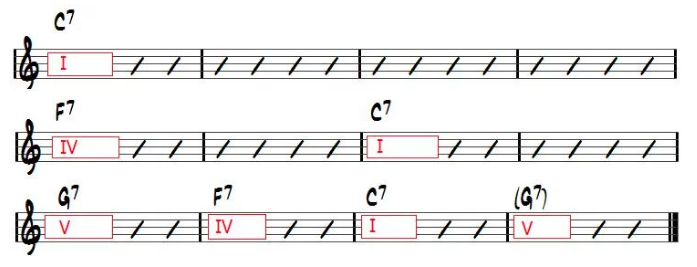 This is the traditional 12 bar blues form, with no added jazz chords. If you're looking for that stuff (i.e. Jazz Blues study materials), let me direct you right over here!
This is the traditional 12 bar blues form, with no added jazz chords. If you're looking for that stuff (i.e. Jazz Blues study materials), let me direct you right over here!
Now, let's get into it 👇
Tension and Release
One of the hallmarks of the blues is the way that tension and release is used to build excitement.
This happens both in the actual lyrics of the songs, and solos!
For example, here are the opening lines to "Don't Throw Your Love On Me So Strong":
Hey baby, don't throw your love on me so strong.
Hey baby, don't throw your love on me so strong.
Yeah, your love is like a faucet, you can turn it off and on.
If you break it down, here's what this really is:
- phrase 1 - introduction
- phrase 2 - tension
- phrase 3 - release
Listen to this great T-Bone Walker version to hear it for yourself! Notice how when he's soloing around the melody, his phrases mostly follow that formula:
introduction, tension, release.
The first two more subdued phrases build tension, which is then released in the more exciting 3rd phrase. It's a great way build an exciting solo!
Plus, this makes it sound like you're actually playing the song as opposed to playing "over" the song. I'm sure we've all been guilty of the latter at some point 😅
Blues Vocabulary
Now that we've established that tension and release can help build a great solo, you'll probably want to try it out for yourself.
I've put together a selection of classic licks to help you do just that:
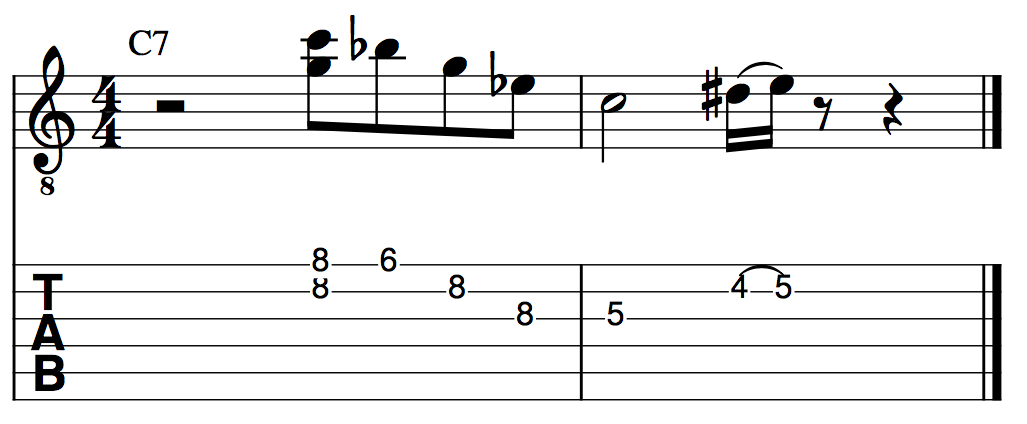 This is a simple minor pentatonic scale lick, starting with a double stop.
This is a simple minor pentatonic scale lick, starting with a double stop.
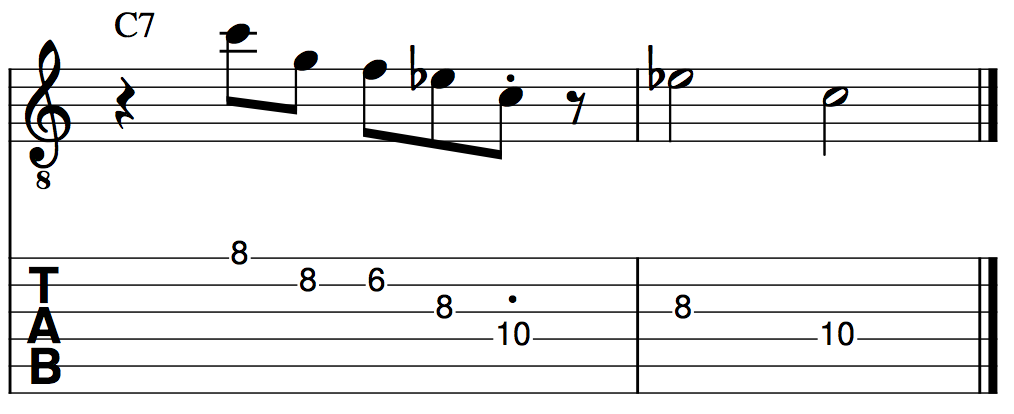 Another minor pentatonic scale lick! Works great on the IV chord as well.
Another minor pentatonic scale lick! Works great on the IV chord as well.
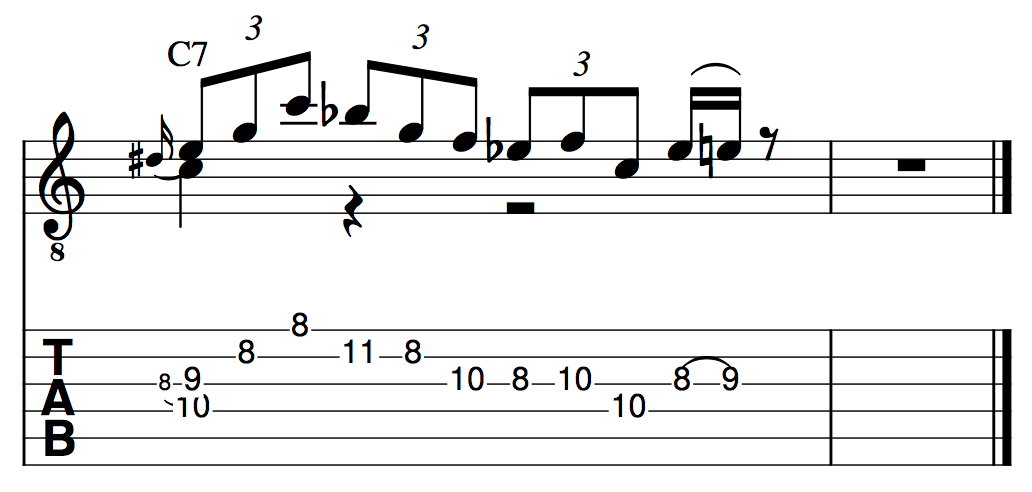 This one is intended to be played with a medium-slow triplet feel. Try changing the rhythms to make it work in a jazz context!
This one is intended to be played with a medium-slow triplet feel. Try changing the rhythms to make it work in a jazz context!
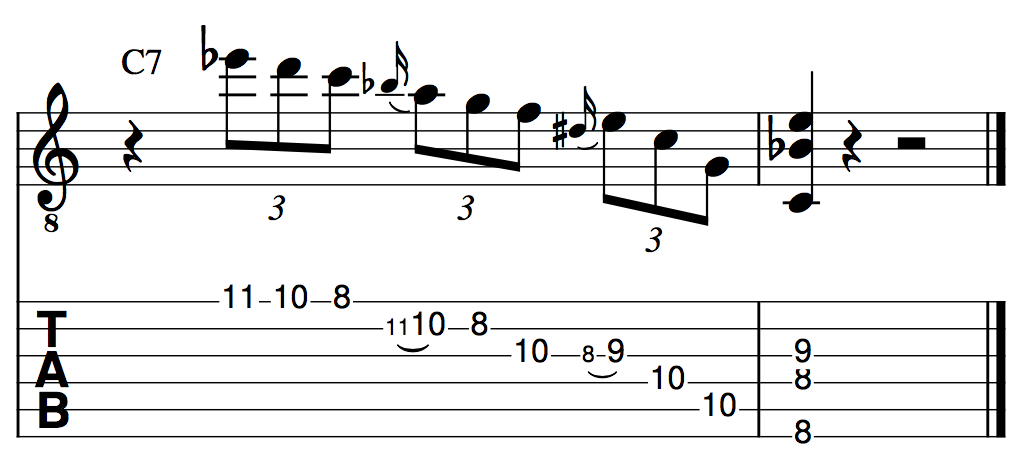 Another nice triplet line, this time ending with a C7 shell voicing. This one also borrows a few notes from the C Mixolydian scale!
Another nice triplet line, this time ending with a C7 shell voicing. This one also borrows a few notes from the C Mixolydian scale!
If you're having trouble reading any of these rhythms, we've got you covered here!
Feel free to mix and match to get started - this is no replacement for really learning the songs, but it's a fun way to get your feet wet.
After you've got these licks under your fingers, try to use them in a jazz blues or a rhythm changes solo 🎵
The Blues 'Tude
Last but not least, learning the blues can add an extra layer of attitude to your playing, and really make your lines sing.
Part of this is because of the way blues players are unafraid of guitaristic things like bends, slides and trills. These techniques can be very expressive but for some reason have been underused by jazz guitarists.
Just listen to Jeff Beck play Mingus, or Roy Buchanan play Misty! These guys have studied the blues, and it shows. They have an added swagger to their playing that we can all learn from.
Here are a few jazz guitarists who also have that blues 'tude:
Grant Green - THE jazz player to transcribe if you're looking for simple, tasty blues licks with a jazz twist. Check out this blues and just try not to tap your foot!
Wes Montgomery - Kind of like Grant Green, but dialed up to 11! If you want to start working on your Wes impression, try taking any of the licks above and playing them in octaves. Or harmonizing with drop 2 voicings!
John Scofield - Blending blues vocabulary with jazz is clearly something Sco enjoys quite a bit! It's cool to hear how he mixes blues licks with modern techniques like pedals or even Holdsworth-style legato playing.
Further Listening
If I've successfully convinced you to dive into the world of traditional blues, you're gonna want to get some recordings by:
- BB King
- Albert King
- Albert Collins
- Stevie Ray Vaughan
- Muddy Waters
- Buddy Guy
- Freddie King
...just to name a few! So get crackin', bend those strings!









